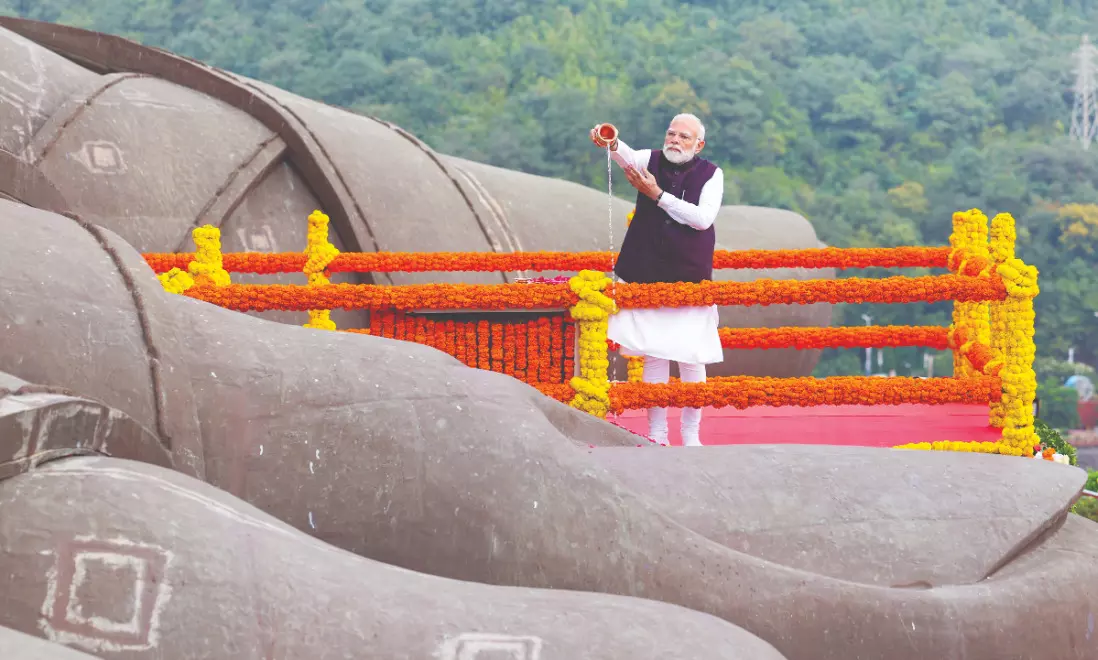
KEVADIA, GUJARAT, Oct. 31 -- Prime Minister Narendra Modi on Friday said that illegal immigration was endangering India's demographic balance and called for a nationwide resolve to remove infiltrators, describing them as a "big threat to the country's unity and integrity."
Speaking at the Rashtriya Ekta Diwas celebrations marking the 150th birth anniversary of Sardar Vallabhbhai Patel at Ekta Nagar in Kevadia, Modi said the challenge of infiltration had persisted for decades, straining national resources and threatening internal harmony. "For decades, infiltrators have been sneaking into the country. They have been occupying and using the resources of our nation. They altered the demographic balance and put the unity of the country at risk," he said.
The Prime Minister alleged that previous governments ignored this danger for political gains. "The previous governments had closed their eyes to this big threat. They put the security of the country at risk for vote bank politics," he remarked. Modi said the current government had decided to confront the issue head-on. "For the first time, the country has decided to wage a decisive battle against this threat. I had announced the Demography Mission from the Red Fort on August 15, 2025," he said.
He urged the nation to take a collective pledge to rid India of illegal infiltrators. "Those opposing it are not concerned if the country gets divided again. But when the security and identity of the nation are in danger, everyone is affected. So, on this Rashtriya Ekta Diwas, we should take a pledge that we will remove all the infiltrators from Bharat," Modi said.
While he did not name any specific groups, the Prime Minister was referring to concerns about infiltration from Bangladesh and Myanmar, which have raised demographic concerns in Assam, West Bengal, and parts of the Northeast.
During his Independence Day speech earlier this year, Modi had announced the Demography Mission aimed at addressing the risks to India's demographic composition posed by illegal immigration. He has described the issue as one of national security, warning that demographic shifts in border regions can undermine social cohesion and livelihoods.
At the event in Kevadia, Modi paid floral tribute at the Statue of Unity and administered the Unity Pledge. The celebration featured a grand parade by contingents of the Central Armed Police Forces and state police units. Calling the morning at Ekta Nagar "divine", he said that marking Sardar Patel's 150th birth anniversary was a moment of immense pride for the nation. Millions of people across India, he said, participated in the "Run for Unity," symbolising collective resolve and strength. He also released a commemorative coin and a special postal stamp in Patel's honour.
The Prime Minister recalled Patel's role in uniting over 550 princely states after Independence to form modern India. "Sardar Patel believed in creating history rather than recording it. His vision of 'Ek Bharat, Shreshtha Bharat' continues to guide us," Modi said, adding that Rashtriya Ekta Diwas now holds the same importance in national life as Independence Day and Republic Day.
He said Patel placed India's sovereignty above all else, a value that was not upheld by subsequent governments. "Historical mistakes weakened national security, such as the situation in Kashmir and the spread of Naxal-Maoist extremism," he said. "After 2014, we worked with determination to correct those errors." Referring to the abrogation of Article 370, he said that "the long-pending dream of fully integrating Jammu and Kashmir has finally been realised."
On internal security, Modi said that India now gives "a strong and decisive response" to any threat, whether internal or external. Citing Operation Sindoor, he said, "This is the India of the Iron Man, Sardar Patel-a nation that will never compromise on its security and honour." He noted that Naxal-Maoist violence had sharply declined, with the number of affected districts dropping from 125 before 2014 to just 11 today.
Modi said that protecting India's unity requires equal attention to social, cultural, and developmental integration. He outlined four pillars of national unity: cultural unity, linguistic unity, development without discrimination, and emotional connectivity. "It is our spiritual and cultural heritage that has kept India united for thousands of years," he said. The Prime Minister urged citizens to promote mother tongues while learning other Indian languages to strengthen national bonds.
On development, Modi said that 25 crore people had been lifted out of poverty in the past decade. "Millions have received homes, clean drinking water, and healthcare. A life of dignity for every citizen is our mission and vision," he said. He pointed out that modern infrastructure projects such as highways, expressways, and Vande Bharat trains are helping bridge regional divides and connect people across the country.
The Prime Minister also spoke about his government's efforts to shed remnants of colonial rule. He cited renaming Rajpath as Kartavya Path, adopting a new flag for the Indian Navy, and building the National War Memorial and National Police Memorial as steps that reflected India's "Nation First" approach. He said that previous governments practised "political untouchability" by sidelining figures such as Sardar Patel, Dr B R Ambedkar, Ram Manohar Lohia, and Jayaprakash Narayan, despite their contributions to the nation.
Concluding his address, Modi called for collective unity as a sacred duty. "When 140 crore Indians stand together, even mountains make way," he said, urging citizens to work toward building a developed and self-reliant India inspired by Patel's vision of national integration.
The parade at Ekta Nagar included contingents from the BSF, CRPF, CISF, ITBP, SSB, and various state police forces. Highlights included a motorcycle display by Assam Police, a camel-mounted band by the BSF, and a showcase of gallantry medal winners from the BSF and CRPF. Ten tableaux on the theme "Unity in Diversity" were also presented. Later, the Prime Minister interacted with officer trainees participating in the 100th Foundation Course under Aarambh 7.0, held on the theme "Reimagining Governance".
Published by HT Digital Content Services with permission from Millennium Post.
